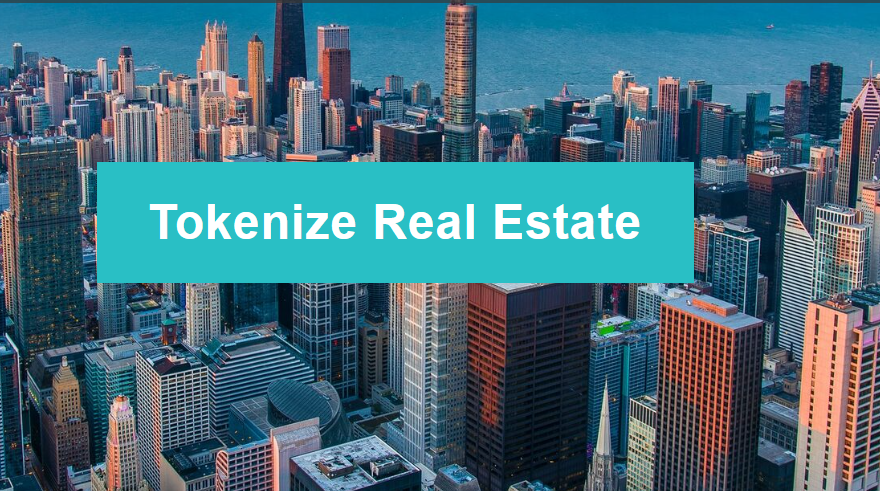The Concept of Tokenization
The Advantages of Real Estate Tokenization
The Potential Impact of Tokenization on Real Estate Investment
Real estate investment has been a popular form of investment for centuries and with the rise of the digital age the way we invest in real estate has also evolved. One of the most recent innovations in real estate investment is the concept of real estate tokenization.
This article will explore the concept of real estate tokenization its advantages, and its potential impact on the real estate investment landscape.
The Concept of Tokenization
Tokenization is a process of converting a tangible or intangible asset into a digital token. A token is a digital representation of an asset that is recorded on a blockchain. Blockchain technology is a decentralized transparent and secure way of recording transactions.
Tokenization enables the fractionalization of an asset meaning that an asset can be divided into smaller parts and each part can be owned by different investors.
Real estate tokenization is the process of converting real estate assets into digital tokens that can be bought and sold on a blockchain.
The tokens represent ownership in the underlying real estate asset, and investors can buy and sell these tokens just like they would buy and sell stocks.
The Advantages of Real Estate Tokenization
Real estate tokenization offers several advantages over traditional real estate investment:
2.1 Increased Liquidity
Real estate is an illiquid asset, meaning that it is difficult to sell quickly without incurring significant transaction costs. However real estate tokenization can increase liquidity by enabling investors to buy and sell tokens representing ownership in a real estate asset.
This can make it easier for investors to exit their investments, providing them with more flexibility and reducing the risk associated with holding onto an illiquid asset.
2.2 Fractional Ownership
Real estate tokenization enables fractional ownership meaning that investors can buy and sell small portions of a real estate asset. This can lower the barrier to entry for real estate investment making it more accessible to a wider range of investors.
2.3 Transparency and Security
Blockchain technology provides transparency and security. Which can increase trust in the real estate investment process. By recording transactions on a blockchain investors can verify that their investments are secure and that the underlying real estate assets exist. This can increase transparency in the real estate investment process and reduce the risk of fraud.
2.4 Cost Efficiency
Real estate tokenization can reduce the transaction costs associated with traditional real estate investment.
Traditional real estate investment involves high transaction costs such as legal fees and brokerage fees. However tokenization can reduce these costs by enabling investors to buy and sell tokens directly on a blockchain without the need for intermediaries.
The Potential Impact of Tokenization on Real Estate Investment
Real estate tokenization has the potential to revolutionize the real estate investment landscape in several ways:
3.1 Increased Access to Capital
Real estate tokenization can increase access to capital for real estate developers and investors. By fractionalizing real estate assets, developers can raise capital from a larger pool of investors, which can enable them to undertake larger projects.
This can also provide investors with access to real estate investment opportunities that were previously only available to institutional investors.
3.2 Democratization of Real Estate Investment
Real estate tokenization can democratize real estate investment by making it more accessible to a wider range of investors. Fractional ownership can lower the barrier to entry for real estate investment, enabling more people to invest in real estate assets. This can increase the democratization of real estate investment and enable more people to benefit from the potential returns offered by real estate investment.
3.3 Increased Efficiency and Transparency
Real estate tokenization can increase efficiency and transparency in the real estate investment process. By recording transactions on a blockchain, investors can have a transparent and secure view of their investments. This can reduce the risk of fraud and increase trust in the investment process. Additionally, tokenization can streamline the real estate investment process, reducing the time and cost associated with traditional real estate investment.
3.4 Potential for Secondary Markets
Real estate tokenization has the potential to create secondary markets for real estate assets. By enabling investors to buy and sell tokens representing ownership in a real estate asset, secondary markets can be created where investors can trade their tokens. This can increase liquidity in the real estate investment market and provide investors with more flexibility to manage their investments.
Conclusion
Real estate tokenization is a new innovation in the real estate investment landscape that has the potential to revolutionize the way we invest in real estate. Tokenization offers several advantages over traditional real estate investment, including increased liquidity, fractional ownership, transparency and security, and cost efficiency.
Real estate tokenization also has the potential to democratize real estate investment, increase access to capital, create secondary markets, and increase efficiency and transparency in the investment process. As the adoption of blockchain technology and real estate tokenization continues to grow, the potential impact on the real estate investment landscape is significant.

